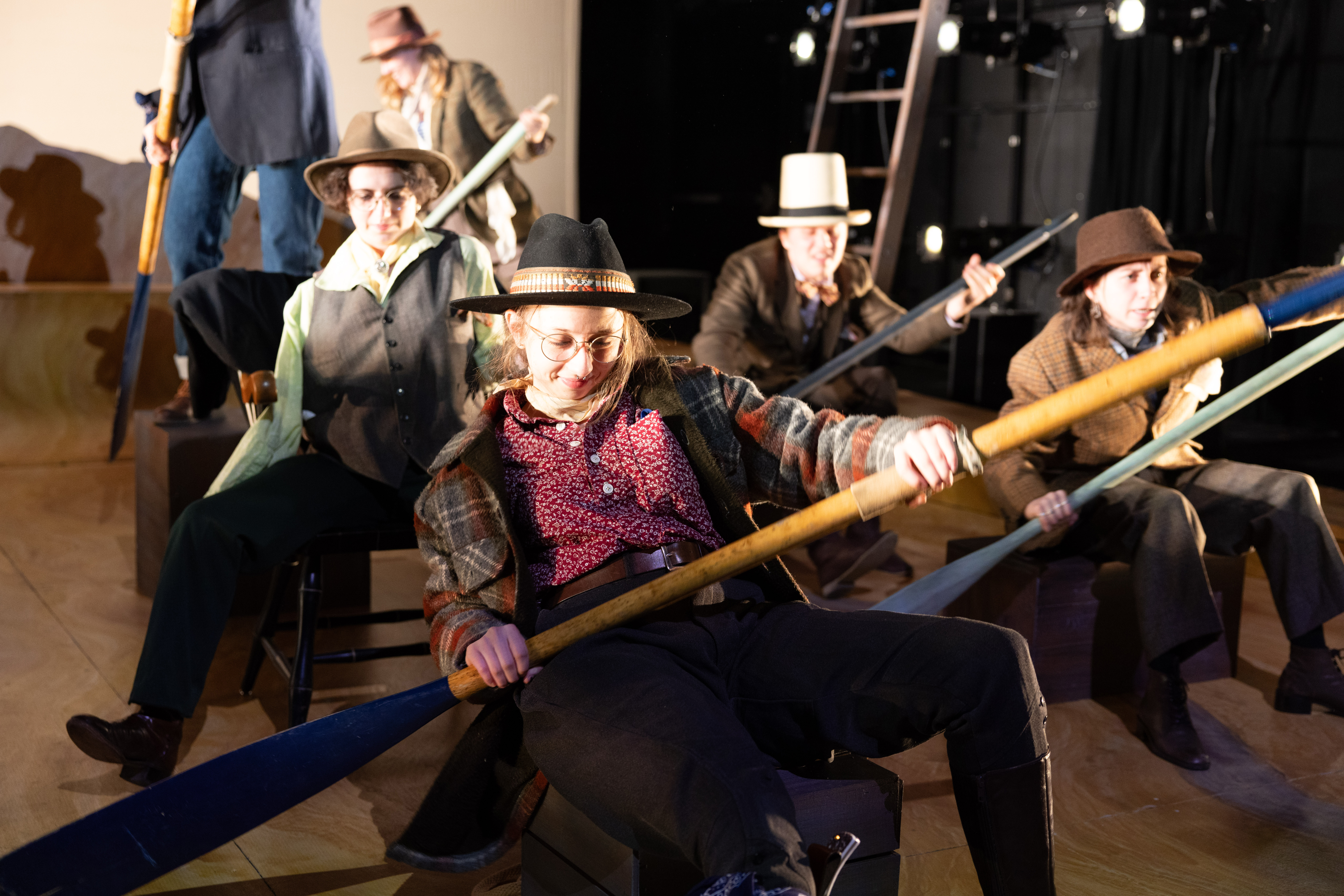Reclaiming the river: “Men on Boats” production questions who tells history
March 28, 2025
 Courtesy of Molly Haley
Courtesy of Molly HaleyWish Theater gushed with laughter and excitement as the cast of “Men on Boats” took the audience on an intimate journey down the raging Colorado River.
From February 27 to March 1, the Department of Theater and Dance presented “Men on Boats,” a play that tells the story of the “first” group of people to brave the Colorado River passage to the Grand Canyon. The ensemble show, written by Jacyln Backhaus, comments on issues of gender and colonialism in the history and mapping of the American Western frontier.
While the characters in the play are cisgender white males, the play calls for the entire cast to be composed of people who do not identify as such. For Mira Pickus ’25, who starred as the leader of the crew, John Wesley Powell, this facet drew her into the production.
“I wanted to be in the production, because I saw that it was a play with all male characters that you’re specifically not supposed to cast that way,” Pickus said.
Oceana Hangret ’25, who played William Dunn, was similarly drawn to the production because of its commentary on historical gender roles.
“I thought it was really interesting that a play called ‘Men on Boats’ was supposed to have a full cast of non-cisgendered males,” Hangret said. “I got the message of, at the end of the day, who’s going to tell your story? And how many voices have we lost because stories have constantly been told by white males in history?”
Director Jessica Pearson-Bleyer, a visiting professor of theater, said that she would not be interested in “Men on Boats” if it recounted the story of these men going down the Colorado River with white male actors.
“The play asks us as the director, as the actors and as the audience to reframe who got to be in charge of deciding what America was,” Pearson-Bleyer said. “These are just some guys who got to go in and make these huge decisions, because they were in the particular set of identities that a group of people decided were in charge, not because they had the knowledge, not because they [had] the capabilities.”
“Men on Boats” often toes the line between comedy and drama, featuring intense monologues alongside satirical scenes to exhibit the hubris of these men attempting to navigate and name land that was not theirs to claim ownership of.
Pearson-Bleyer said that she wanted the play to be “hilarious” and “terrifying,” sometimes even in the same moments, because she wanted to draw out that fine line between comedy and horror.
Pickus commented on how the cast took that note and found pockets of comedy between serious scenes of the tribulations throughout the crew’s journey.
“I think it was easy to play the change of relationships among [the] crew seriously and the stakes and the fragility of life seriously … alongside the humor that any of them think they have the right to be there on that river doing what they’re doing,” Pickus said.
As an ensemble show, the entire cast remained on stage for the majority of the play, which allowed the cast to explore character dynamics outside of scripted dialogue.
“Even when you are not talking or directly in the scene, you have business on stage,” Pickus said. “It was really fun to find that personally with Powell and to watch everyone flesh out their character very specifically, because there’s not a moment where they don’t need to be a character.”
“Men on Boats” was written based on Powell’s journals throughout the real expedition. Hangret read some of the original journal entries to understand her character and how he would interact with others in the play. Her research heavily contributed to how she approached transitions between scenes.
“It was fun to see how our characters really shined through transitions, because we couldn’t make it any faster, so why not make it fun?” Hangret said. “So we decided, why not throw some ad lib in there and truly show the dynamic of the character and their relationship to other characters.”
Hangret noted that the biggest challenge the production faced was the health of the cast, with many cast members and Pearson-Bleyer contracting the flu throughout the production.
“A lot of people got really sick, so when we rehearsed, we had to imagine people there, which was kind of hard,” Hangret said. “I ended up losing my voice a couple days before the show, and I had to bounce back really quickly.”
Pearson-Bleyer expressed admiration for the cast’s continued support of each other during an extremely difficult production and was proud of the resulting show despite those challenges.
“It’s really easy, when things are going well for everybody, to be lovely. It’s much harder when things are going poorly,” Pearson-Bleyer said. “For everybody to still be wonderful and supportive—that was really nice.”

Comments
Before submitting a comment, please review our comment policy. Some key points from the policy: